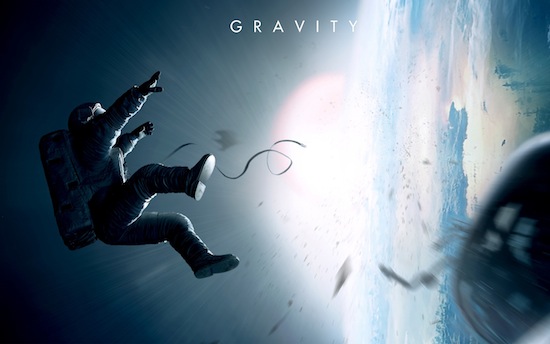We run our website the way we wished the whole internet worked: we provide high quality original content with no ads. We are funded solely by your direct support. Please consider supporting this project.
Gravity: You Don’t Know What You’ve Got Until It’s Gone
 I had read a number of reviews about the movie “Gravity,” so when Shelley and I decided to enjoy a mid-week date night at the movies, I entered the theater with some pretty high expectations. The movie more than exceeded all those expectations.
I had read a number of reviews about the movie “Gravity,” so when Shelley and I decided to enjoy a mid-week date night at the movies, I entered the theater with some pretty high expectations. The movie more than exceeded all those expectations.
“Gravity” is an off-the-charts intense thriller, made all the more exciting because the fate the two main characters (played by Sandra Bullock and George Clooney) must constantly fight is the horrifying prospect of floating off alone into deep space with nothing else to do but watch their oxygen level slowly run out – pretty much like being buried alive in slow motion! Yet, this was one of those rare nail-biters that managed to leave emotional space for some truly poignant moments, sprinkled in with several splendid moments of comedic release.
On top of this, I thought the cinematography was absolutely Oscar worthy. It’s not just that the backdrop of the earth and an endless star-filled sky throughout the movie is breath taking. Even more impressive was the remarkably realistic way that people and objects are depicted as violently interacting with each other in zero-gravity space. So too, the use of distance and silence to draw you into Ryan’s feeling of lonely despair as she twirls helplessly out into deep space was nothing short of brilliant. (By the way, this is a movie you must see in 3D. More than half the thrill will be lost otherwise). And, finally, while both Clooney and Bullock were great, I felt that Bullock in particular knocked it out of the park! This was by far her best performance. Bullock masterfully pulls you into the depth of the darkness her character experiences as she faces the likelihood of dying alone, as well as the darkness she has been enveloped in since the tragically random death of her beloved four-year-old daughter years ago.
Which brings me to the aspect of this movie that I felt outshined everything I’ve said so far. The most profound aspect of this movie was the way it wove together two stories, the first about two astronauts struggling to survive against all odds after suffering a catastrophe in space, the second about a woman trying against all odds to find a reason to go on living after suffering a catastrophe on earth. And the thing that made this weaving so brilliant was that, at every turn, the first story symbolized the second. And the thematic cord that tied them together was gravity.
Interesting title, especially when you consider that the whole movie is without it. And that, you’ll find, is the point. Every problem the two astronauts confront is because they lack gravity. Without gravity, we humans are vulnerable to random chaos flung at us by forces much greater than ourselves. Without gravity, we are threatened with the possibility of floating off into nothingness. Without gravity, we desperately cling to anything, or anyone, to save us from the infinite void. (The intensity of almost every thrill scene is due to the tenuous nature of the grasp that keeps the astronauts from floating away – or not). We learn that this is precisely the condition Ryan has been living in since her daughter’s death. Lacking any foundation to hold her in place, her grasp on life is tenuous, with the void threatening to sweep her away. As she spins helplessly into the void, in one scene, we are watching a woman whose external environment perfectly reflects the state of her soul. If you keep your eyes open, you’ll find the symbolism runs throughout, and it’s powerful.
Finally, and most interesting of all from my perspective, there is a theological dimension to the way these two stories are woven together. I felt the question of God’s existence was already being raised by the way this movie repeatedly depicted horrendously destructive events by forces that were utterly indifferent to the welfare of humans taking place against the backdrop of the breathtaking beauty of the earth and stars. But the question becomes much more explicit as the astronauts continue to talk into their radios in the unlikely hope that someone “out there” can hear them. Here too the story of the plight of Ryan in space symbolizes the story of Ryan’s soul, for we are again seeing into the soul of a woman who has always wanted to cry out for “someone out there.” She just didn’t know how, and didn’t know if it would do any good even if she did.
On both a physical and spiritual level, Ryan longs for gravity. As to whether she finds it or not, that will be for you to decide.
Category: General
Tags: God, Movie Review
Related Reading

Why Believe that There Is a God?
“Why should we believe in God in the first place?” This was a question that Greg’s father asked of Greg. While there are many ways to respond, Greg’s offered what is called “the anthropological argument.” Here is an excerpt from Letters from a Skeptic. _____________________ My basic line of reasoning is this: We human beings…

Why a “Christocentric” View of God is Inadequate: God’s Self-Portrait, Part 5
I’m currently working through a series of blogs that will flesh out the theology of the ReKnew Manifesto, and I’m starting with our picture of God, since it is the foundation of everything else. So far I’ve established that Jesus is the one true portrait of God (See: Part 1, Part 2, Part 3, Part 4).…

By Chance or By God
pure9 via Compfight Is the world here by chance? Are we a product of an impersonal force that got the ball rolling and then history came about in what could be described as an “accident”? Greg’s father, an skeptic at the time, put it this way, “[C]ouldn’t we just have come about by accident? Isn’t…

When God Endorsed Polygamy
We often find God acting as if he supports things we know, by other means, that he does not. For example, though his ideal was monogamy, it’s clear in the biblical narrative that, once God decided to permit men to acquire multiple wives and concubines, he was not above bearing the sin of his people…

Reasons God Does Not Control Everything
First, the belief that God is all-powerful does not mean that God exercises all power. It only means that God is the ultimate source of all power. Fallen people may value the ability to control others and project this attribute onto God (Matthew 20:25-28). But the cross breaks all of our fallen assumptions about what…

Review: “The Butler”
For all the same reasons that some couldn’t set their politics aside to celebrate what the election of Obama meant for African Americans, I’m quite sure that some won’t be able to set their politics aside to appreciate the brilliance and power of “The Butler.” These folks will also likely allege that I’m being inconsistent…
